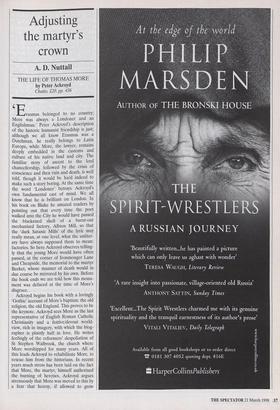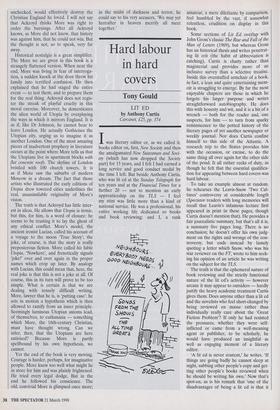Adjusting the martyr's crown
A. D. Nuttall
THE LIFE OF THOMAS MORE by Peter Ackroyd Chatto, £20, pp. 436 Erasmus belonged to no country; More was always a Londoner and an Englishman.' Peter Ackroyd's description of the historic humanist friendship is just; although we all know Erasmus was a Dutchman, he really belongs to Latin Europe, while More, the lawyer, remains deeply embedded in the customs and culture of his native land and city. The familiar story of ascent to the lord chancellorship, followed by the crisis of conscience and then ruin and death, is well told, though it would be hard indeed to make such a story boring. At the same time the word 'Londoner' betrays Ackroyd's own fundamental cast of mind. We all know that he is brilliant on London. In his book on Blake he amazed readers by pointing out that every time the poet walked into the City he would have passed the blackened shell of a burnt-out mechanised factory, Albion Mill, so that the 'dark Satanic Mills' of the lyric may really mean, at one level, what the unliter- ary have always supposed them to mean: factories. So here Ackroyd observes telling- ly that the young More would have often passed, at the corner of Ironmonger Lane and Cheapside, the memorial to the martyr Becket, whose manner of death would in due course be mirrored by his own. Before the book ends we are told how this monu- ment was defaced at the time of More's disgrace. Ackroyd begins his book with a lovingly `Gothic' account of More's baptism: the old religion, the old England. This proves to be the keynote. Ackroyd sees More as the last representative of English Roman Catholic Christianity and a festive/devout world- view, rich in imagery, with which the biog- rapher is plainly half in love. He writes feelingly of the reformers' despoliation of St Stephen Walbrook, the church where More worshipped for many years. All of this leads Ackroyd to rehabilitate More, to rescue him from the historians. In recent years much stress has been laid on the fact that More, the martyr, himself authorised the burning of heretics. Ackroyd argues strenuously that More was moved to this by a fear that heresy, if allowed to grow unchecked, would effectively destroy the Christian England he loved. I will not say that Ackroyd thinks More was right to order the burnings. After all Ackroyd knows, as More did not know, that history was against him, that he could not win. But the thought is not, so to speak, very far away.
Historical nostalgia is a great simplifier. The More we are given in this book is a strangely flattened version. When near the end, More was living in fear of interroga- tion, a sudden knock at the door threw his family into terrified confusion. He then explained that he had staged the entire event — to test them, and to prepare them for the real thing. Ackroyd does not regis- ter the streak of playful cruelty in this moral exercise. Moreover, he domesticates the alien world of Utopia by overplaying the ways in which it mirrors England. It is as if, like Dr Johnson, he cannot bear to leave London. He actually Gothicises the Utopian city, urging us to imagine it as another London. One of the most amazing pieces of inadvertent prophecy in literature occurs at the point where More tells us that the Utopians live in apartment blocks with flat concrete roofs. The skyline of London bristled with 100 church towers. It is as if More saw the suburbs of modern Moscow in a dream. The fact that those artists who illustrated the early editions of Utopia drew towered cities underlines the real, unassimilable originality of More's vision.
The truth is that Ackroyd has little inter- est in ideas. He allows that Utopia is ironic, but this, for him, is a word of closure: he seems to be trusting it to lay the ghost of any ethical conflict. More's model, the ancient ironist Lucian, called his account of a voyage to the moon 'True Story'; the joke, of course, is that the story is really preposterous fiction. More called his fable Utopia, 'Nowhere', and frenetically signals `joke!' over and over again in the proper names which crop up later. By analogy with Lucian, this could mean that, here, the real joke is that this is not a joke at all. Of course, this in its turn will prove to be too simple. What is certain is that we are dealing with tensely difficult writing. More, lawyer that he is, is 'putting case': he sets in motion a hypothesis which is then allowed to ramify from an inner principle. Seemingly luminous Utopian axioms lead, of themselves, to euthanasia — something which More, the 16th-century Christian, must have thought wrong. Can we infer, then, that the Utopians are here satirised? Because More is partly spellbound by his own hypothesis, we cannot.
Yet the end of the book is very moving. Courage is harder, perhaps, for imaginative people. More knew too well what might lie in store for him and was plainly frightened. He tried every legal dodge. But in the end he followed his conscience. The old, convivial More is glimpsed once more; in the midst of darkness and terror, he could say to his very accusers, 'We may yet hereafter in heaven merrily all meet together.'





































































 Previous page
Previous page